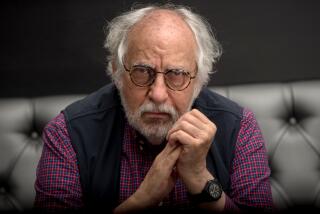Camilo Jose Cela, 85; Spanish Author Won Nobel
- Share via
MADRID — Camilo Jose Cela, a flamboyant novelist from Spain who won the 1989 Nobel Prize in literature with his crude, straightforward writing style, died Thursday. He was 85.
Cela died from chronic heart disease, Hospital Cemtro in Madrid said.
With his first novel, “The Family of Pascual Duarte,” Cela became the leader of an uncommonly plain-spoken style of writing called tremendismo that clashed with the lyricism of previous Spanish writers.
Spanish novelist and essayist Francisco Umbral said Cela’s death represented the “disappearance of the last great Spanish writer, creator of fables, of language, of words, with a prodigious capacity of expression.”
A bon vivant known in Spain for his flamboyant lifestyle, Cela’s writing tended to show a darker side of life. He drew from his experiences in the Spanish Civil War for many of his stories, which were often violent and gruesome.
He was recruited as a private to fight on the side of the rebel forces led by future dictator Gen. Francisco Franco, but was released after being seriously wounded. He later published an anti-fascist magazine that became a forum for opposition to the 36-year Franco dictatorship.
“The Family of Pascual Duarte” was first published in Argentina in 1942 because it was deemed too violent and crude for Spain at the time.
It tells the story in the language of a rural, uneducated man who commits a series of brutal murders without really knowing why and ends up being executed. It often is credited with creating a sort of literary vanguard, both in Spain and Latin America, in the years immediately following the 1936-39 Spanish Civil War.
Another well-known work, “The Hive,” published in 1951, takes place in the cold, depressing postwar years and depicts starving writers who would sit for hours during the winter in Madrid’s literary cafes.
When Cela was awarded the Nobel Prize in literature in 1989, the Royal Swedish Academy cited him for “rich and intensive prose, which with restrained compassion forms a challenging vision of man’s vulnerability.”
It said “The Family of Pascual Duarte” was the most popular work of fiction in Spanish since Miguel Cervantes’ masterpiece “Don Quixote” was published nearly 400 years ago.
Cela greeted the honor with aplomb, saying it could just as easily have gone to many other Spanish writers. “Life is like a game of tennis,” he told reporters, “and this time I won.”
He also spoke of what the prize might mean for his legacy, and how he’d like to be remembered. Using the crude language common to his fiction, Cela said he would like this epitaph: “Here lies someone who tried to screw his fellow man as little as possible.”
The son of a Spanish father and English mother, Cela was born in 1916 in comfortable surroundings in the town of Iria Flavia in the northwestern region of Galicia.
Over his lifetime, Cela produced more than 70 works, including essays, poems and travel books, and 10 novels. But at home, he was better known for his love of food, travel and women. He enjoyed touring his country in a Rolls-Royce and sometimes reminisced about fellow writer Ernest Hemingway.
“We went to a lot of bullfights together. He was a great author and a great friend,” Cela said in Stockholm in 1989.
Cela was the fifth Spaniard to win the Nobel in literature, but the first novelist. Previous winners from Spain included two poets and two playwrights.
In 1977, two years after the death of Franco, Vicente Aleixandre, an obscure poet from Spain’s prewar literary generation, received the Nobel Prize for literature. Fellow poet Juan Ramon Jimenez received the award in 1956.
Spain’s first literary Nobel laureate was playwright Jose Echegaray, who won in 1904. Playwright Jacinto Benavente won the award in 1922.
At his death, Cela was involved in an unresolved court battle with an obscure Spanish writer, Carmen Formoso Lapido, who accused him of plagiarism. She said a novel she wrote in the early 1990s served as the basis for Cela’s “La Cruz de San Andres,” which won Spain’s prestigious Planeta Award in 1994.
Cela is survived by a son and his wife, Marina Castano, who was his literary aide and whom Cela called his muse.
Burial is scheduled for today in his hometown in Galicia.
More to Read
Sign up for Essential California
The most important California stories and recommendations in your inbox every morning.
You may occasionally receive promotional content from the Los Angeles Times.













